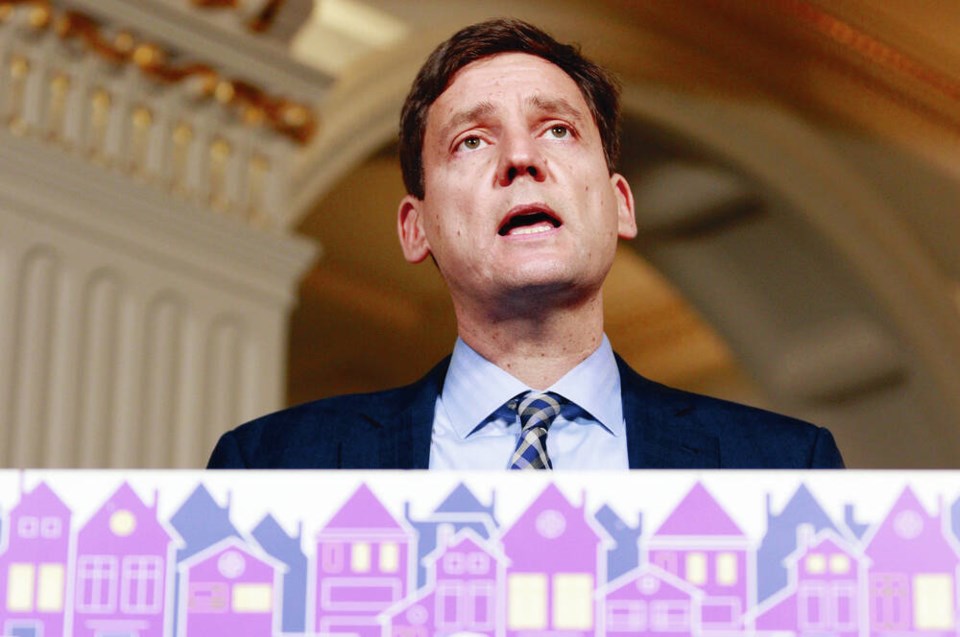VANCOUVER — Expanding British Columbia’s electrical system is an economic and environmental opportunity the province must use to its advantage, said Premier David Eby.
A planned 10-year, $36-billion expansion of B.C.’s electrical system by the public energy utility, Crown-owned B.C. Hydro, will open clean energy economic opportunities and ensure there is ample power to supply the province’s growing population, he said Wednesday.
B.C. Hydro’s 50 per cent increase in capital project investments, from $24 billion to $36 billion over the next decade, will focus on increasing electrification and operations that reduce emissions across the province, said Eby.
“Thirty-six billion dollars of investment in our power system means a few things,” Eby said in an interview. “It means opening up new economic opportunities for the province with our affordable, clean electricity. There are a lot of companies that want to locate here if they can access the kind of power that we can provide through this investment.”
Businesses worldwide are looking to invest and build in locations that can provide affordable, clean electricity for their projects, he said.
Expanding B.C.’s electrical grid gives the province a clean energy advantage that is being sought worldwide, he said.
“The examples are clean hydrogen production, which uses electricity to split water molecules to create hydrogen for export,” he said.
B.C.’s Ministry of Energy, Mines and Low Carbon Innovative said in a statement this week that there are about 50 proposed hydrogen sector projects in B.C., ranging from large-scale production facilities to hydrogen-fuelling stations and heavy-duty trucking pilot projects.
The ministry said B.C. accounts for 60 per cent of Canada’s research investment in hydrogen and fuel-cell development.
About 70 per cent of B.C.’s energy demand is met through fossil fuels, including gasoline, diesel and natural gas, said the ministry.
Eby was at a Prince George pulp mill Tuesday to highlight the company’s efforts to reduce carbon emissions by replacing the natural gas it uses to fuel its boilers with hydrogen. The premier said the buildup of B.C.’s electrical system will also help mines, pulp mills and other resource industries transition from non-renewable fuels to electricity.
The investment could involve building new high-voltage transmission lines, expanding and constructing substations and upgrading B.C.’s dams, Eby said.
“The plan really emphasizes getting more power out of our existing infrastructure: dams across the province that can be made more efficient at relatively lower cost to produce significantly more power for us as well as getting those transmission lines to different parts of the province to electrify industry and support smaller communities in getting off diesel generators,” he said.
The plan could see the creation of up to 12,500 construction jobs.
The focus of the increased spending on high-voltage transmission lines, substations and refurbishments of existing generating facilities was encouraging, said Barry Penner, B.C.’s Energy Futures Initiative chair.
“EFI supports the upgrading of B.C.’s vital transmission and distribution network, particularly in the north but also in more urban centres, said Penner, a former B.C. environment minister, in a statement. “While perhaps not considered as glamorous as new generation, electricity cannot be delivered to homes and businesses without wires,” he said. “That’s why it is encouraging to hear decision makers publicly recognizing the importance of investing in this form of infrastructure.”
An expanded electrical system could also allow the province to sell more power to its neighbours in Alberta, Washington state, Oregon and California, Eby said.
“We made a billion dollars last year trading electricity and there is increased demand, especially from Washington state if they close coal-fired power plants and fossil-fuel power plants in the state,” he said. “It’s an opportunity for export income for B.C. It’s an opportunity for domestic job growth and it also ensures reliability with drought, with falling water levels of our reservoirs.”
Eby said the recent cold weather in B.C. saw B.C. Hydro meet increased electricity demand challenges, but the province’s growing population will require a robust electrical system.
“Four of Canada’s fastest growing cities are located in B.C., and with that rapid growth we’ve seen in our population, especially in the Kelowna area, the Lower Mainland and south Vancouver Island, comes increased demand for power for everything from heating to air conditioning to just running your appliances around the house,” said Eby.



